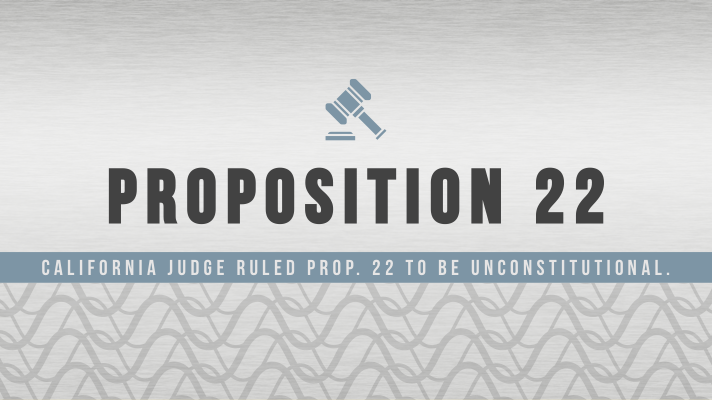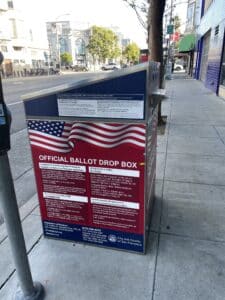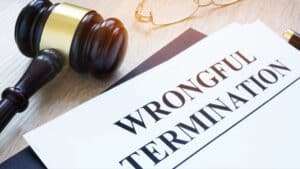Written By Christopher B. Dolan and Matthew D. Gramly
This week’s question comes from Josh D. from Marin County:
With our current 24-hour news cycle it’s hard to keep up with all the important issues in our daily lives. It seems like Proposition 22 was an initiative constantly discussed 5 years ago that went away. Did Proposition 22 ever take effect?
Thanks for reaching out Josh. Many people may have forgotten about Proposition 22. On August 20, 2021, Alameda County Superior Court Judge Frank Roesch ruled Proposition 22 to be unconstitutional. Recall that Proposition 22, a ballot initiative passed by California voters in 2019 permitted many gig economy companies such as Uber, Lyft and Door Dash to classify their drivers as independent contractors instead of employees of those companies. These companies and others poured over $200 million into the campaign to pass Proposition 22. The benefit to these companies in classifying their drivers as independent contractors (not employees of the companies) is that these companies can then evade almost every regulation in place governing how companies treat their employees as well as virtually every cost associated with having employees such as health insurance benefits, minimum wage laws, safety regulations, workers compensation insurance, etc. As it relates to drivers, these companies would be excused from paying employees mileage, reimbursing them for the cost of gasoline and vehicle maintenance. The cost savings to these companies would have been in the billions of dollars annually. The downside of course, is that the drivers would have to pay for their own health insurance coverage, for example, and would have almost none of the benefits that most full-time employees receive. The cost savings to the companies gets shifted almost entirely to the drivers as an expense to them.
Proposition 22 was far reaching and expansive in its language and in the sheer number of components it included. For instance, it also contained language that would prohibit drivers from forming a union. For that reason, as well, Judge Roesch wrote, Proposition 22 violated the Constitutional requirement that ballot initiatives be limited to a single subject. Relative to this component prohibiting unionization, Judge Roesch wrote that this prohibition,
“appears to only protect the economic interests of the network companies in having a divided, un-unionized workforce, which is not a stated legal goal of the legislation.”
Judge Roesch is saying that the drafters of Proposition 22 overreached both on process and in substance.
Proposition 22 itself was created as a ballot initiative by these companies as a direct response to Assembly Bill 5, a law passed by the California State Legislature and signed by Governor Gavin Newsom. AB 5 would have required these types of companies to classify their drivers as employees and conferring upon those employees such benefits as minimum wage protections, workers compensation insurance, overtime pay, etc. Much of the basis for Judge Roesch’s ruling in finding Proposition 22 to be unconstitutional rests largely on the idea that in California, in accordance with the California State Constitution, only the State Legislature can, for example, regulate compensation for workers’ injuries. That goal cannot be accomplished through a ballot initiative process because the Constitution grants that right exclusively to the Legislature. In essence Judge Roesch said that Proposition 22 took that power away from the Legislature, thereby violating the State Constitution. In his ruling, Judge Roesch did say that the voters of California do have the power to make such a change to the State Constitution, but “If the people wish to use their (ballot) initiative power to restrict or qualify a plenary and unlimited power granted to the Legislature, they must do so by (a ballot) initiative constitutional amendment, not by (a ballot) initiative statute.” Voters would have to amend the Constitution first, amending it to permit, in effect, the passage of legislation through ballot initiatives. Neither the voters nor the Legislature have thus far amended the State Constitution in such a manner. The State Legislature had followed the Constitution in properly passing AB 5 through the legislative process as dictated by the Constitution. The backers and authors of Proposition 22 had not, thereby violating the State Constitution.
A spokesperson for ride sharing company Uber said that the company will file an appeal of Judge Roesch’s ruling imminently. Uber has since filed their appeal and requested a stay on Judge Roesch’s ruling until their appeal is complete. That means that while Uber’s appeal is pending, Judge Roesch’s order does not yet take effect, thereby leaving Proposition 22 in effect unless and until the appellate court hears the case and issues a ruling. So, for now, at least, these companies do not yet have to classify their drivers as employees and can continue to classify them as independent contractors, saving companies like Uber, Lyft and Door Dash billions of dollars in costs in the meantime, to the detriment of their drivers.










